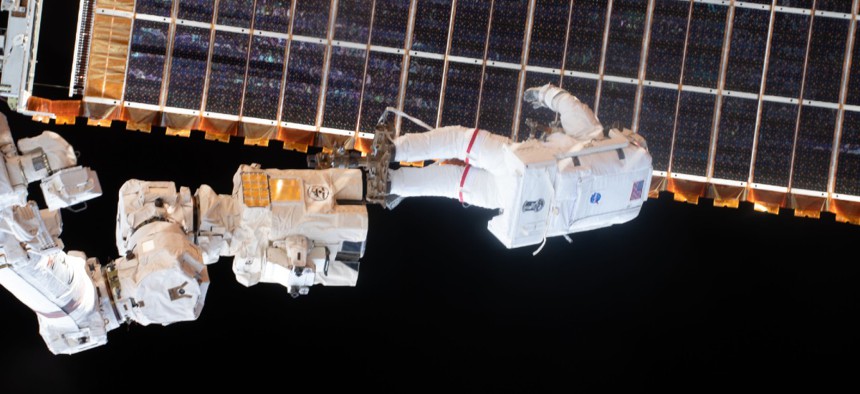NASA Wants Industry to Build Next-Generation Space Stations

Spacewalker Thomas Pesquet of the European Space Agency outside of the International Space Station. NASA
The space agency is looking to industry to design and build destinations in space that can be used for tourism and science-based missions.
With the International Space Station approaching the end of its lifespan, NASA is looking to the private sector to build the next generation of space stations and other space-based destinations for science-based missions and the burgeoning space tourism industry.
“The [ISS] should be able to be operated safely for several years, but eventually we anticipate somewhere in the latter part of this decade, we are going to retire it,” Phil McAlister, NASA's director of commercial spaceflight, said Wednesday at Nextgov’s Emerging Tech Summit. “And we are going to need a destination to go to, and our plan is for that next destination to not be government-built. We want that to be provided by the private sector so that we can just buy services from that destination, just like anybody else. We want to be one of many customers.”
To accomplish this, the space agency recently solicited proposals from industry for the first of a two-phase project it calls the Commercial Low-Earth Orbit Destinations. The Destinations project itself is part of NASA’s broader plan for commercial space development, wherein NASA is setting its sights on deep space exploration and leaving the keys to low-earth orbit to industry. McAlister said NASA will partner with private-sector companies to develop these destinations, similar to how the agency has partnered with SpaceX and Boeing through its Commercial Crew Program, wherein NASA invested in the development of—and will purchase flights from—private-sector companies.
McAlister said the development of commercial destinations in space is a pivotal moment for NASA, allowing the agency to focus more on deep space exploration. People can now purchase tickets to fly into space, McAlister said, but the profit motive is reduced when it comes to deep space.
“I think our role will be again to sort of push the boundaries of space exploration outward,” McAlister said. “The solar system is a big place, so I think NASA is going to be very busy in the coming decades. There’s a lot of amazingly interesting places to go in the solar system, and I hope we visit them all.”
RELATED PODCAST






